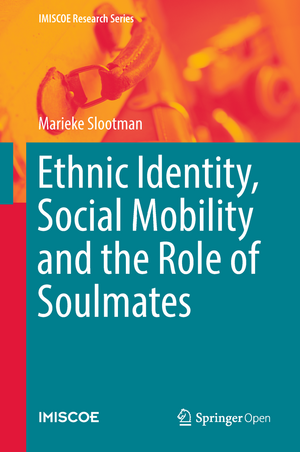Ethnic Identity, Social Mobility and the Role of Soulmates: IMISCOE Research Series
Autor Marieke Slootmanen Limba Engleză Hardback – 4 oct 2018
| Toate formatele și edițiile | Preț | Express |
|---|---|---|
| Paperback (1) | 359.57 lei 38-45 zile | |
| Springer International Publishing – 11 ian 2019 | 359.57 lei 38-45 zile | |
| Hardback (1) | 371.50 lei 38-45 zile | |
| Springer International Publishing – 4 oct 2018 | 371.50 lei 38-45 zile |
Din seria IMISCOE Research Series
-
 Preț: 228.70 lei
Preț: 228.70 lei -
 Preț: 279.98 lei
Preț: 279.98 lei -
 Preț: 422.90 lei
Preț: 422.90 lei -
 Preț: 279.62 lei
Preț: 279.62 lei -
 Preț: 451.76 lei
Preț: 451.76 lei -
 Preț: 179.42 lei
Preț: 179.42 lei -
 Preț: 424.81 lei
Preț: 424.81 lei -
 Preț: 438.26 lei
Preț: 438.26 lei -
 Preț: 280.27 lei
Preț: 280.27 lei -
 Preț: 132.95 lei
Preț: 132.95 lei -
 Preț: 281.15 lei
Preț: 281.15 lei -
 Preț: 266.19 lei
Preț: 266.19 lei -
 Preț: 359.42 lei
Preț: 359.42 lei -
 Preț: 231.65 lei
Preț: 231.65 lei -
 Preț: 436.35 lei
Preț: 436.35 lei -
 Preț: 434.44 lei
Preț: 434.44 lei - 15%
 Preț: 700.75 lei
Preț: 700.75 lei -
 Preț: 424.43 lei
Preț: 424.43 lei -
 Preț: 425.20 lei
Preț: 425.20 lei -
 Preț: 429.83 lei
Preț: 429.83 lei -
 Preț: 425.58 lei
Preț: 425.58 lei -
 Preț: 429.61 lei
Preț: 429.61 lei -
 Preț: 424.43 lei
Preț: 424.43 lei -
 Preț: 426.18 lei
Preț: 426.18 lei -
 Preț: 420.79 lei
Preț: 420.79 lei -
 Preț: 426.94 lei
Preț: 426.94 lei -
 Preț: 429.61 lei
Preț: 429.61 lei -
 Preț: 425.42 lei
Preț: 425.42 lei - 15%
 Preț: 636.45 lei
Preț: 636.45 lei -
 Preț: 426.18 lei
Preț: 426.18 lei -
 Preț: 424.99 lei
Preț: 424.99 lei -
 Preț: 430.21 lei
Preț: 430.21 lei -
 Preț: 423.84 lei
Preț: 423.84 lei -
 Preț: 427.71 lei
Preț: 427.71 lei -
 Preț: 427.71 lei
Preț: 427.71 lei -
 Preț: 433.85 lei
Preț: 433.85 lei -
 Preț: 430.79 lei
Preț: 430.79 lei -
 Preț: 424.43 lei
Preț: 424.43 lei -
 Preț: 426.56 lei
Preț: 426.56 lei - 15%
 Preț: 583.45 lei
Preț: 583.45 lei -
 Preț: 427.71 lei
Preț: 427.71 lei - 15%
 Preț: 528.13 lei
Preț: 528.13 lei
Preț: 371.50 lei
Nou
Puncte Express: 557
Preț estimativ în valută:
71.10€ • 73.66$ • 59.33£
71.10€ • 73.66$ • 59.33£
Carte tipărită la comandă
Livrare economică 17-24 martie
Preluare comenzi: 021 569.72.76
Specificații
ISBN-13: 9783319995953
ISBN-10: 3319995952
Pagini: 206
Ilustrații: XV, 202 p. 2 illus., 1 illus. in color.
Dimensiuni: 155 x 235 mm
Ediția:1st ed. 2018
Editura: Springer International Publishing
Colecția Springer
Seria IMISCOE Research Series
Locul publicării:Cham, Switzerland
ISBN-10: 3319995952
Pagini: 206
Ilustrații: XV, 202 p. 2 illus., 1 illus. in color.
Dimensiuni: 155 x 235 mm
Ediția:1st ed. 2018
Editura: Springer International Publishing
Colecția Springer
Seria IMISCOE Research Series
Locul publicării:Cham, Switzerland
Cuprins
1. Ethnic-Minority Climbers. Winning the Golden Calf.- 2. Studying Ethnic Identification. Tools and Theories.- 3. A Mixed-Methods Approach.- 4. The Dutch Integration Landscape.- 5. Self-identifications Explored. ‘Am I Dutch? Yes. Am I Moroccan? Yes’.- 6. Identifications in Social Contexts. ‘I am… who I am.- 7. Trajectories of Reinvention. Soulmates and a ‘Minority Culture of Mobility’.- 8. Ethnic Identity and Social Mobility. Wrapping up.- Appendix A: Interview Guide.- Appendix B: Table Chapter 4.- Appendix C: Tables Chapter 5.
Recenzii
“The appropriate audience for Slootman’s Ethnic Identity, Social Mobility and the Role of Soulmates, may include scholars and policy experts dealing with ethnic identity, migration, nationalism, assimilation, integration or multiculturalism. For academicians, policy makers and lay readers alike, the book provides a nuanced perspective from the vantage point of ethnic migrants towards understanding ethnic minority identity and national integration.” (Maguipuinamei Rejoyson Thangal, Psychological Studies, Vol. 65 (3), 2020)
Notă biografică
Marieke Slootman is a researcher and lecturer at the department of Sociology of the Vrije Universiteit Amsterdam. She earned her PhD (cum laude) at the University of Amsterdam. The Dutch Sociological Association (NSV) awarded her dissertation with the prize for Best Sociological Dissertation written at a Dutch University in 2013/2014. Slootman’s research focuses on processes of minoritization and exclusion, processes of identification and social mobility, and on diversity in educational institutions.
Textul de pe ultima copertă
Based on a study among higher-educated adult children of lower-class Turkish and Moroccan immigrants in the Netherlands, this open access book explores processes of identification among social climbers with ethnic minority backgrounds. Using both survey data and open interviews with these ‘minority climbers’, the study details the contextual and temporal nature of identification. The results illustrate how ethnicity is contextual but have tangible and inescapable effects at the same time. Also the findings call for a more reflexive use of terms like ethnic ingroup/outgroup and bonding/bridging. Overall, the book helps us understand the emergence of middle-class segments that articulate their minority identities and as such it will be of great interest to academics, policy makers and all those interested in processes of integration and/or diversity.
Caracteristici
This open access book demonstrates the complexity of identifications and provides guidelines on how to study it Combines the exploration of individual mechanisms with indications of generalizability Shows that qualitative and quantitative methods do not necessarily belong to separate paradigmatic domains
